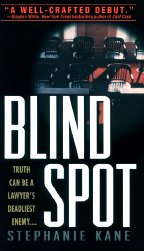Blind Spot
Stephanie Kane
Bantam Books/Random House
US Paperback
ISBN: 0-553-58175-9
Publication Date: October, 2000
321 Pages; $5.99
Date Reviewed: March 30, 2004
Reviewed by: Terry D'Auray © 2004

REFERENCES
COLUMNS
|
|
|
Blind SpotStephanie KaneBantam Books/Random HouseUS PaperbackISBN: 0-553-58175-9Publication Date: October, 2000321 Pages; $5.99Date Reviewed: March 30, 2004Reviewed by: Terry D'Auray © 2004 |
|
|
REFERENCES |
COLUMNS |
There's an hilarious short story in Crime Wave 7 called 'Esther Gordon Framlingham' written by Anthony Mann, about a frustrated would-be mystery writer who is trying to come up with a series gumshoe who is truly unique. He searches in vain for any possible (not necessarily plausible) combination of gender, geography, era/decade, social class, vocation, avocation, proclivity and affliction that hasn't been done before. And he ultimately fails. Stephanie Kane's 'Blind Spot' proves that not all these elements need be unique for a mystery/suspense novel to work. Her protagonist, Jackie Flowers, is a female criminal defense attorney in contemporary Denver, Colorado. Nothing new so far. But Jackie is dyslexic, and Kane weaves her dyslexia expertly through both character and plot to provide an interesting, and ultimately successful, new twist on an otherwise ordinary serial killer story.
Jackie Flowers is a struggling defense attorney handling too many DUIs and date rape cases, who longs for the juicy, high-profile murder case to recharge her enthusiasm and rev her career. In a case of "be careful what you wish for", she gets one - a local construction entrepreneur accused of raping, then gruesomely decapitating, a prominent millionaire's trophy wife. Aaron Best, the accused killer, freely admits bedding the trophy wife, but adamantly denies beheading her. As Jackie pursues his defense, she uncovers discomforting details about Best's past and even more unsettling links to multiple similar murders in the Denver area over the past 15 years, all still unsolved. Each of the past murders involved women stabbed and left dead, their bodies wedged into grisly positions midst rocks and ravines in well-traveled outdoor locales in the Denver area. Jackie enlists the help of a local criminal profiling expert to help her identify the serial killer she dubs "Hollow Man" and successfully defend her client.
The plotting of 'Blind Spot' is adept and coherent, but not startlingly original. The pacing is surefooted and quick, with disturbing revelations popping up in well-timed sequence to sustain the tension. Kane quickly establishes 'Blind Spot' as a serial killer story by mixing chapters written from the, at this point unknown, killer's point of view with those from Jackie's perspective. This technique often used in these types of stories to add dimension and horror to the killer's character, and, of course, to drop hints as to the killer's identity. Nothing new here either.
Since it's clear this is a serial killer story, not solely a legal defense story, the reader starts lurching ahead, anticipating the denouement and guessing at the identification of the killer. Kane provides several plausible choices - the defendant himself, the defendant's brother, the profiler and potential love interest, and any number of other court-related characters. And while the killer's identity, revealed at the very end of the book, is none too startling, Kane mixes the revelation with a realistic confrontation to build a satisfying conclusion.
Kane's character Jackie provides the originality in this novel. Her dyslexia, an invisible handicap, is revealed slowly and quite subtly, with hints and clues dropped as carefully as those that expose the ultimate murderer. Jackie's assistant does her reading for her, she takes no notes, but instead draws pictographs, she drives slowly and easily gets lost. While her dyslexia is a source of embarrassment and shame for Jackie, it also lets her to view the world differently, and with compassion, and spurs her to fight all the harder to win her victories.
Kane's prose is highly readable, realistic and perceptive, and it flows smoothly from tough courtroom dramatic scenes to gentle and sensitive interactions with her precocious neighbor, an adopted Asian girl, also dyslexic. Her dialogue is excellent, and her courtroom scenes so strong I would have easily traded the whole serial killer business for more of them. Kane mixes realism and wit in counterpoint with descriptions of the fogginess and lapsed concentration of a dyslexic professional trying to hold herself and her world together. It's an interesting and engaging blend and makes for a satisfying start to Kane's unique take on a "series gumshoe".